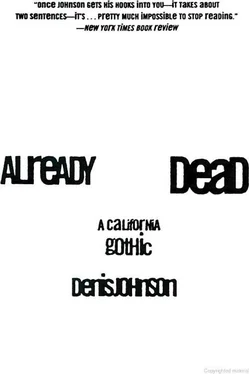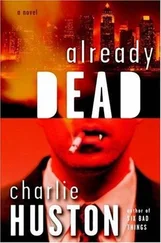“Hey,” she said. “Clarence…?” and fell asleep.
“Yeah?” he said.
The cook banged her up the next morning and handed her two boxed breakfasts through the car’s window.
“For the road.”
“Thank you very much.”
“Can’t let that little stomach get growly.”
“Say thank you, Clare.”
204 / Denis Johnson
“Thank you.”
The cook was a little woman with short arms and a flat face and a long-ago smile. “It’s just the number three minus the gravy. You don’t want gravy in a cardboard go-box.”
“No ma’am.”
“Where you heading?”
“Well, we’re trying after a crop, if there is one.”
“Sea urchins.”
“Lemme get that open for you, Clare. Sit up straight. Put it straight, you’re gonna spill it and have a mess all over you. Sea urchins?”
“Yeah, they’re like a cross between a cucumber and a garden slug.
The Japanese pay a shitload of money for things like that.”
“Where do you pick ’em?”
“Near the sea, I guess. Or right down in it, for all I know.”
“I’m no swimmer.” She opened her box and fell to with the white plastic fork.
“Anyway the coast is just right this time of year. Summer’s a bitch with a gun down along this stretch, I’m sure you noticed. Man. If I could cook gourmet I’d go to one of those little hamlets by the sea.”
“This is good. Gourmet enough for me, eh.”
“You ever been to Pacific Grove or any of those places?”
“Not as I believe.”
“Anyway I think you’ll find what you’re looking for in the sea.”
“Are you religious?”
“Fuck no. Not even close.”
“I am.”
“Your boy’s got big beautiful eyes. What do you see with them eyes, sweetie?”
“I don’t know.”
“The girls are gonna eat you up. Did you know that?”
“No.”
“Well, they are.”
She drifted the Dodge past the Phillips 66 with the broken door on its john and the row of motel rooms with their red doors burning in the morning light, and gassed up as cheaply as she could at the other one, the Star Store and Fuel, figuring the distance to still cheaper prices at about four gallons’ worth, or fifty-two miles. Back Already Dead / 205
again on Interstate 5 with the driveline’s regular shudder tunneling under her and the tires’ intoxicated tremolo drilling her ears and the tightness starting in her nape, she begged for safe passage and unmit-igated guidance and wiped the sweat from the wheel with a sour washcloth. They passed lengths of farmland separated increasingly by blonde hills. Buzzards explored the world far overhead, and beneath the buzzards a crop duster biplane switched back and forth over the highway, laying out a billowy white spoor. Mother and child drove right through it. “Hold your breath, Clare.” The plane’s image passed across the mirror. “Shit. That’s him. That’s the closest thing to Satan you’ll see today. Remember how people got sick at the orchard?” She was coughing, dizzy, saw a giant foot planted in the sky with its bestial claws dripping venom. She needed a breather here but felt wary of turning off the car. Yesterday she believed she’d come to the desert to break down and lift her heart, felt the great promise in coming up against a storm — miraculous, unique type of storm — then her car gets fixed and she herself also, popped by the character from Los Angeles, and now the man gone and his smell all over her and the storm lifted, just the clear vista faintly messed with by agricultural chemicals.
So the dust storm wasn’t the thing. And the desert wasn’t the place.
And the man was definitely not the man.
Carrie on Route 5 negotiated palpitating zones of heat alongside burn piles that cracked and rattled like the last two cars on the bone train, and then a whole acreage being burned away, the wind unrolling a black rug fringed with flames and thick mustard-tinted smoke across the open fields toward the anvil of the heavens…She made for the coast — up Route 5 as far as the town of Williams and then west over to Ukiah on California 20, past Ukiah along the Boonville road into rolling hills and oaks, and then among redwoods in Anderson Valley, on through Boonville to Mountain View Road, a skinny lonely zigzag alongside precipices made less nauseating by enclosing forestation, then down a long grade from whose halfway point she spied the open Pacific, where she had to get clean, even drown herself if necessary — made for the coast with something gigantic happening to her there to the west, and eastward, back of her, all death and Devil.
At the Coast Highway’s T she observed the stop sign, waited in a pointless silence, in which she could smell the surf, while nobody and 206 / Denis Johnson
nothing came north or south, and then turned left only from a vague desire to have the Pacific at her right hand. The first town was Manchester, but it had no cafes, and they headed through it, passed a seaside Catholic cemetery in a cypress grove, stopped for supper in Point Arena, and south of there pulled into a lay-by with a public outhouse. Hours past dark she suddenly disliked the feeling here and sat up and drove off, deciding to keep on for Anchor Bay. “Eight miles,” she told Clare when they passed a sign. Around 2 A.M. they arrived.
“Where are we?”
“Usually you don’t ask.”
He put his fingertips together before his face and lowered the joined hands slowly to his lap, watching the car’s descent along a steep curve.
She and Clarence rolled into Anchor Bay just as a storm broke—“Big thunder, little rain,” she told him.
In the morning she shut the car door quietly so as to leave him sleeping and strolled among rows of trailers and motor homes to the toilet barn, carrying her kit bag and a change. The feathers of the redwoods had been washed and then torn by the storm and now rested, outlined with damp, on the dry patches of asphalt that remained from some paving operation many years back. The clock she kept on the dash had run down. She guessed the morning at eight. The campground lay mostly in shadow, but toward the beach the sun had found it, and she stood in the light to watch a few skinny wetsuited surfers who looked a lot like seals, slumped forward astride their boards and talking; she could hear their voices, the voices not yet changed of young boys. It swept over her, the feeling of having arrived and seeing no place further to go. She turned to the shack and went through the door marked LADIES
and showered for some minutes, tromping her clothes clean beneath her on the stall’s mildewed boards.
When she came out and wandered toward the stretch of beach to lay out her wash, she came upon a man, blond and bearded, the blue of whose eyes, like windows giving directly onto the water behind him, made his head seem like an empty quiet room.
The man was dry and fully clothed, but he appeared to have been borne here by a wave and now to be emerging cleansed and changed from the sea. “You know,” he said, smiling at her, “something strange happened last night.”
Already Dead / 207
Something not just strange, but also bad. She could see that much.
“Oh, no.”
“He’s dead.”
“Oh, no. I’m sorry.”
“I’ve just been walking up the shore all night. I never left the shore.
Climbing over rocks and stuff like that. Cliffs. The radar’s got me all screwed up.”
She lowered her gaze and mutely prayed for him.
“What’s your name?”
“Carrie. What about you?”
“Fairchild.”
“That’s a perfect name for you. Or I would have chosen Goodman or something like that.”
“Thank you.”
“You’re welcome.”
“What are you doing here, anyways?”
Читать дальше












